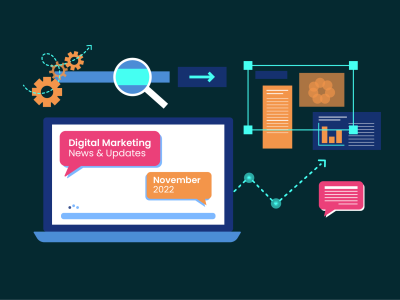16th November 2022

Google is giving the Data studio a change of name, releasing new spam updates, and announcing the sunset of similar audiences while introducing new search labels for coupons and promos. At the same time, Uber is receiving privacy concerns as they present updated ads.
[lwptoc min=”2″ skipHeadingLevel=””]
The popular data reporting platform has changed its name to Looker Studio. Google said, “starting today, Data Studio is now Looker Studio.” Then adding, “With this complete enterprise business intelligence suite, we will help you go beyond dashboards and infuse workflows and applications with the intelligence needed to make data-driven decisions.
Why did they make the change?
Because they are trying to unify the Google business intelligence products “under the Looker umbrella”. Google launched Data Studio in March 2016 as a free-to-use platform that lets you turn your data into an informative, easy-to-read and share dashboard.
Google has also announced that they are releasing a paid version of Looker Studio named Looker Studio Pro. They have said the Pro version would have new enterprise management features, team collaboration features and SLAs.
Google is releasing a new search ranking algorithm update targeting the more spammy side of search results. However, they predict it will take around a week for the update to be fully noticed in the search results.
Google has written, “While Google’s automated systems that detect search spam are constantly operating, we occasionally make notable improvements to how they work. When we do, we refer to this as a spam update and share when they happen on our list of Google Search ranking updates”.
An example of this is the SpamBrain AI-based prevention system. Google occasionally improves the design, making it better at catching spam. However, Google has recommended that sites that see a change due to spam updates should check the spam policy to ensure their websites still comply.
Violating the policies may cause their sites to rank lower or not appear in search results.
Uber plans to implement “journey ads”, which will be ads based on a rider’s travel history and geographical location.
Though not available globally, the company is testing ads with a few brands. The new product will allow the ads to be shown in the Uber app at least three times during the journey. The rider can also conduct transactions by clicking the ad to buy a product without leaving the Uber app.
There are, however, some privacy concerns over the new products being introduced. Significant problems are coming from the US, as the new rules and regulations around abortions have been released. People have raised concerns about an invasion of privacy, should they have to get an Uber to get an abortion. However, according to The Wall Street Journal, “Uber’s advertising policy forbids targeting users by factors such as race, religion or sexual orientation, and it also prohibits basing ad targeting on certain types of destinations, including government buildings, hospitals and reproductive-health centres”.
Uber has stated that it does not share its individual customers’ data with advertisers and is committed to serving exciting and relevant ads to its users without compromising privacy. Uber said, “We will continue to maintain a high bar when it comes to protecting user privacy and being transparent about how we use data to power our products”.
The continuing focus on customer privacy has resulted in Google Ads Liaison Ginny Marvin confirming that Google is phasing out similar audience targeting in 2023. So if you are currently using similar audiences in your campaigns and ad groups, there won’t be any change. However, you can still use the existing equal audience segments until August 2023. After that, you cannot add new similar audience segments to campaigns.
Google states that this audience change is because of the evolution of online marketing approaches and privacy-preserving alternatives developing. In addition, Google has realised the importance of some user targeting when it comes to advertising products and services efficiently. They have seen that without alternative advertisers, users will move away from using Google, significantly affecting their advertising revenue.
Google is updating shopping search results with new labels and highlighting coupons, promotions and the ability to compare prices from multiple retailers. According to a recent survey by Google, 43% of Americans shopping for the holidays are planning to look for deals and sales more than last year.
Google is a central part of the shopping experience for customers. Google has said, on average, 60% of people who shop online said in a recent survey that they’d used Google properties for shopping in the past two days. To help searchers find the items they want at the best available prices, Google is rolling out several new features.
These new features include promotional badges on search results and items that offer a discount using a coupon code and a coupon clipping feature allowing searchers to save promo codes when they’re ready to buy what they were looking for. They will also introduce price insights, allowing you to see the prices across merchants and whether the price is low or high based on historical values.